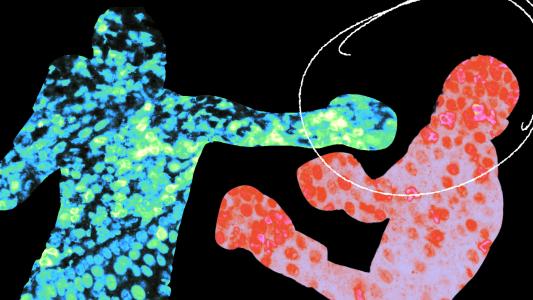Yale researchers have developed a cancer vaccine for dogs that nearly doubles their 12-month survival rate — and it might be a powerful treatment for humans with cancer, too.
Sick as a dog: In 2011, the FDA approved the first ever cancer immunotherapy — a treatment that supercharges the immune system to fight cancer — and today, oncologists have dozens of powerful immunotherapies in their arsenal, with more coming every year.
That’s not the case if the oncologist happens to treat dogs instead of people, though.
“There have been very few new canine cancer treatments developed in decades.”
Mark Mamula
Cancer in dogs is, unfortunately, very common — one in four will get it at some point — but the development of immunotherapies to treat man’s best friend has significantly lagged behind the development of ones to treat man.
“There have been very few new canine cancer treatments developed in decades — it’s a field that is begging for improvement,” said Mark Mamula, an immunologist at Yale.
Cancer vaccine for dogs: Mamula is being the change he wants to see in canine oncology.
Several years ago, his team at Yale developed a cancer vaccine that triggers the production of antibodies that bind to two proteins commonly found on certain cancer cells: EGFR and HER2 (these are common mutations in human cancers). This helps the immune system find and fight the cancer.
After the vaccine showed promise in mice, the team decided to trial it in dogs.
“Dogs, just like humans, get spontaneous cancers. They arise naturally,” Mamula told the Hartford Courant in October 2023. “They get virtually all of the same cancers that humans do … and they almost all have identical growth and mutations that human cancers have.”
“I cannot leave this alone. I have to see this to the end.”
Mark Mamula
In 2016, Mamula’s team launched the first clinical trial of the vaccine in canines, and since then, it’s been administered to more than 300 dogs with three types of cancer (osteosarcoma, hemangiosarcoma, and transitional cell carcinoma).
The trials are ongoing, but the results so far have been remarkable.
The studies haven’t included control groups, but dogs with these cancers usually have just a 35% chance of living for more than a year after diagnosis. The 12-month survival rate among vaccinated pups has been 60%.
“My original goal was to really do a limited canine therapy trial and then move quickly into human trials, but the canine work has gone so well, and I honestly believe that it has such value that I cannot leave this alone,” Mamula told the Canine Cancer Alliance in 2020. “I have to see this to the end. I really do.”
Looking ahead: Mamula still hopes to see the cancer vaccine trialed in people, but right now, his focus is on canines. He’s founded a company, TheraJan, to produce the treatment and has submitted it to the US Department of Agriculture (USDA) for review.
The USDA could approve the cancer vaccine for dogs as soon as April, meaning it might not be long before this potentially game-changing treatment is widely available.
“[I]n veterinary oncology, our toolbox is much smaller than that of human oncology,” said Gerry Post, a veterinarian who helped Mamula launch an early study of the shot. “This vaccine is truly revolutionary. I couldn’t be more excited to be a veterinary oncologist.”
Ultimately, Mamula still hopes to see the cancer vaccine trialed in people, as these mutations are also commonly found in some human cancers, but that will require an entirely different testing and regulatory process.
We’d love to hear from you! If you have a comment about this article or if you have a tip for a future Freethink story, please email us at [email protected].






